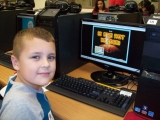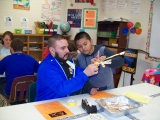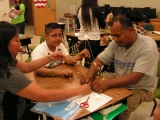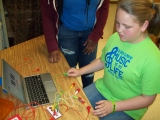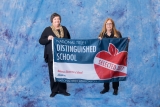-
Category 2
Selected in 2017
-
Grades: 3 - 5
School Setting: rural
Town Population: 6,574
Student Enrollment: 618
Student Demographics:
Black/African American: 3.1%
Teacher/Student Ratio: 1:13.4
White/Caucasian: 30.6%
Hispanic: 60.9%
Hawaiian/Pacific Islander: 2.6%
Asian: 0.3%
Native American: 1.1%
Other: 1.5%
% Reduced Lunch: 80.6%
% ELL Learners: 58.4%
Founded: 1917 -
PRINCIPAL:
Terriann Phillips -
CONTACT:
233 Treating Plant Road
Dequeen, AR 71832
870-584-4311
tphillips@dequeenleopards.org
- Describe specific programs in place to ensure that families are involved in the success of your school and students.
-
Our greatest successes with family involvement targets grade levels or specific groups of students. Families participate in a specific type of activity or subject area. We target each grade level in a different area. Third grade parents participate in a math and literacy night. Activities are planned around a themed book appropriate for our overall population. Students receive the book and activities match the theme. We average 200-225 participants.
Fifth grade families attend a science night and rotate through stations where families interact in experiments, activities, and competitions. High school advanced placement students
demonstrate chemistry experiments, 3D printing, and STEM activities. We average approximately 250-300 participants.
The library media specialist hosts Accelerated Reader nights. Participants read books together and students take quizzes to boost their number of reading points. Parents of struggling students are appreciative of these opportunities.
- Describe the most successful activity your school has initiated to strengthen ties to your community.
-
De Queen School District and De Queen Elementary host a Thanksgiving senior citizens meal for the community. Approximately 200 guests are served. Elementary and high school students provide entertainment and act as servers. It is a positive outing for our seniors and the word is spread throughout the community about the quality of our students. Our fifth grade show choir, Razzle Dazzle, performs for this activity and then continues this ambassadorship to the nursing home and numerous businesses and restaurants during the holiday season.
In an era when youth are often portrayed in a negative light, building positive relationships between students and the community has proven to be a vital asset. Our community members are astounded at the talent, manners, respect and enthusiasm our students display. Numerous community organizations support our students through donating dictionaries, clothing, food for our less fortunate students, and items for hygiene backpacks for the needy.
- Describe your philosophy of school change or improvement.
- School change or improvement should take place after careful consideration of the success or failure of the current climate and procedures and programs. Change shouldn’t happen just for change sake. There should be a specific need. As a general rule, our teachers, interventionists, and facilitators seek new technology and programs that fill in any gaps that have been identified through data disaggregation and perceptual surveys. Additionally, if we determine that a new program is necessary to meet our students’ needs, we conserve any part of the previous program that we see value in and incorporate it with the new program.
- What are your school’s top two goals for the next year?
-
According to Michael Willis, M. S. in The Importance of Academic Language in Achieving Content Area Mastery, “Academic Language is believed to be one of the most important factors in the academic success of English Language learners (ELLs), and it is shown to be a major contributor to achievement gaps between ELLs and English-proficient students.” Although we have a disproportionate number of ELL versus English-proficient students, both groups score competitively on the ACT Aspire. During monitoring, our facilitators identified a deficit in understanding academic vocabulary by both groups. We will concentrate on strategies to improve in this area.
Additionally, we want to foster a life-long love of reading. We will create a community literacy connection to increase authentic reading engagement. We will increase our students’ opportunities for reading, discussion, and activities through after-school book clubs targeting students who struggle in reading.
- What is the single most important factor in the success of your school that others could replicate?
-
After ensuring that we have the best possible people on our staff, the single most important factor in our success is holding students accountable for their education at their ability levels.Free time is secondary to academic responsibilities and success. We continue to remediate until a student is successful. This goes back to the quality of the people you hire, the vision we all share, and a
culture to expect excellence. We have a unique population in many respects; however, all students are taught the same concepts, at the their ability levels, but in different ways. It talks a great deal of effort on everyone’s part to persevere and hold students accountable; however, our ELL students are performing at the same level as our general population.
- Describe the program or initiative that has had the greatest positive effect on student achievement, including closing achievement or opportunity gaps, if applicable.
-
Direct Instruction Reading has been our “bread and butter” for 20 years. Students who can’t read well will not be successful in any academic area. As our population started evolving and test scores dropped, we searched for a program that met the needs of our diverse population. D.I. groups students according to their instructional levels and its structure allows students to move up or back as they progress or need support. D. I. is heavily phonics-based and meets 80% of the standards.
Equally important is Cognitively Guided Instruction. We use CGI to focus on student’s mathematical thinking to guide instruction. Teachers question students’ understanding and lead them to the next step. CGI is incorporated throughout the mathematics curriculum and encompasses all standards for mathematical practice. Students clarify their reasoning with models, numbers, and/or pictures and are urged to justify their reasoning. The heart of a CGI classrooms is knowledge with understanding.
- Explain how Title I funds are used to support your improvement efforts.
-
Our culture embraces excellence, meeting students where they are and extending their skills to maximum potential, student responsibility, and support for staff. Funds support Direct Instruction Reading. Implementation is done with fidelity and Title I funds purchase student and teacher materials, teacher and paraprofessional coaching and supervision, and parapro salaries.
Title I funds support our response to intervention program. We employ interventionists for both reading and mathematics. Interventionists work with classroom teachers and facilitators to identify students who need additional services. They work intensely with Tier 2 and Tier 3 students and support students transitioning to Tier 1.
As research shows, to be successful students have to have their basic needs met first. With this in mind, Title I also supports our homeless program. Qualifying students receive clothing, meals, and field trip expenses to help level the playing field to ensure acceptance and success.
- Identify the critical professional development activities you use to improve teaching and student learning.
-
We utilize outside consultants who represent our instructional programs. After initial implementation, we have refresher sessions to hone our teachers’ skills and address curricular issues. Consultants come throughout the first year of implementation to support our teachers and the curriculum.
Program fidelity is a must for success. DES staff values professional development that comes from local sources. Our facilitators and Direct Instruction Reading Coordinator provide a major portion of our professional development through training, direct modeling, co-teaching, and coaching. Teachers meet with the facilitators quarterly to examine the previous unit’s instruction to determine strengths and weaknesses and if additional resources are needed.
The Direct Instruction Reading Coordinator coaches all teachers and paraprofessionals monthly to ensure the integrity of the program, to provide support, and to test and move students from one group to another to meet individual needs.
- Describe how data is used to improve student achievement and inform decision making.
-
Our teachers and facilitators reflect on ACT data and create pacing guides and alignment documents for the upcoming year. They collaborate to create digital assessments. It is important for students to know how to use the technology components utilized on the ACT so that demonstrating their academic skills won't be hindered by a lack of familiarity with technology.
We utilize a wide-range of data to improve instruction and student achievement. Data is disaggregated to determine our strengths and weaknesses to uncover curricular issues. Students are assessed three times annually for mastery on current learning objectives. If not first-time proficient, students are remediated by the classroom teacher and then by the facilitators for mastery.
STAR assessments provide a vertical assessment and alignment district-wide. It allows us to monitor classes, subpopulations, and individual students. This data helps identify students who need more intensive intervention.
- Describe your school culture and explain changes you’ve taken to improve it.
-
Expecting excellence is the mantra and culture of De Queen Elementary. We expect each student to do his/her best, always striving for growth and excellence. DES endeavors to ensure that all students have equal and fair opportunities, realizing that fair is not always equal.
We feel that people make the difference in success or failure. In order to improve and solidify our culture, we seek employees who share our ideals and who exhibit a spirit of teamwork, tenacity, and personal and professional responsibility. Traditionally, we have very little turnover in our staff. We strive to create an environment and culture that promotes a sense of family to retain the best employees. When presented with the choice of whether to hire the most qualified teacher or the most inexpensive teacher, our board and administration unanimously agree: hire only the best, no matter they fall on the salary schedule. We understand that people are the key behind making any school program successful.
-
Category 2
Selected in 2017
-
Grades: 3 - 5
School Setting: rural
Town Population: 6,574
Student Enrollment: 618
Student Demographics:
Black/African American: 3.1%
Teacher/Student Ratio: 1:13.4
White/Caucasian: 30.6%
Hispanic: 60.9%
Hawaiian/Pacific Islander: 2.6%
Asian: 0.3%
Native American: 1.1%
Other: 1.5%
% Reduced Lunch: 80.6%
% ELL Learners: 58.4%
Founded: 1917 -
PRINCIPAL:
Terriann Phillips -
CONTACT:
233 Treating Plant Road
Dequeen, AR 71832
870-584-4311
tphillips@dequeenleopards.org


